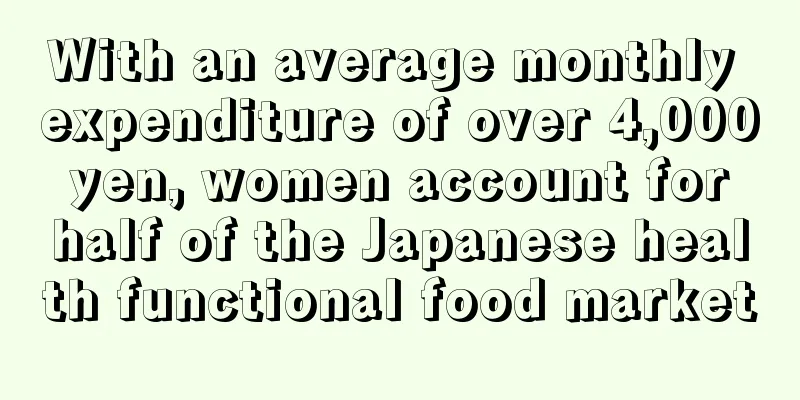With an average monthly expenditure of over 4,000 yen, women account for half of the Japanese health functional food market

|
Japan's Yano Research Institute conducted a consumer questionnaire survey on physical conditions, health foods and functional requirements among 1,200 men and women aged 20 to 70 years old who have experience in taking functional health foods (nutritional supplements).
The subjects were divided into six groups according to age (20 to 30 years old, 40 to 50 years old, and 60 to 70 years old and above) and gender (male and female), and a comparative analysis was conducted.
Among men, young people ( 20 to 30 years old) consumed the most health food, 2.45 kinds. The highest amount of expenditure was by the elderly (60 to 70 years old and above ) , 3,108 yen. On the other hand, women tended to spend more on both the types and the amount of expenditure as they aged, with an average monthly expenditure of more than 4,000 yen.
In addition, in terms of where to buy health foods, drug stores and pharmacies (59.5% for men and 63.5% for women) are the most popular places for young people to buy health foods .
On the contrary , the middle-aged class (40 to 50 years old) prefers "mail order" (51.5% for men and 57.5% for women) , and as the age increases, the proportion of mail order among the elderly (65.0% for men and 70.5% for women) tends to increase.
The most common reason for starting to take health supplements is that "both young and middle-aged people searched on the Internet themselves . " The main reasons for taking health supplements among the elderly are "seeing Internet ads" and "watching TV ads." As they spend more time at home and have more opportunities to surf the Internet, the elderly are also increasing their chances of buying health supplements based on online ads.
Regarding the purpose of consuming healthy foods, 20.5% of young people, 24.0% of the elderly, and 24.5% of elderly women said "to improve immunity," showing that attention to immunity is growing due to the COVID-19 pandemic.
Among the 1,200 men and women who took health foods (supplements) , young men ( 56.5%) took functional foods at least once a week, followed by middle-aged men and elderly women (both 47.5% ), and elderly men ( 45.0%). It can be seen that the intake rate of men is higher , especially the young people .
Regarding the functional requirements for health functional foods , men of every generation are concerned about waist circumference (abdominal fat) , weight loss (35.5% for young people, 37.0% for middle-aged people, and 31.5% for the elderly), and intestinal environment (32.0% for young people, 26.5% for middle-aged people, and 26.5% for the elderly) .
For women, besides abdominal circumference and intestinal environment, maintaining bone health (33.5%) ranked highest among the elderly, revealing that people are very concerned about osteoporosis . Japan female Health functional food |
<<: Quick Look for Sellers: Advertising Statistics of Each Channel (I)
>>: E-commerce growth drives demand for warehouses in Russia, with transaction volume up 45%
Recommend
Leveraging the 600 million “silver-haired” market, senior citizens are also going crazy for online shopping!
In the seventh national census, the population of...
What is Flieber? Flieber Review, Features
Flieber uses advanced technology and data analytic...
Consumers’ peak season shopping trends are out, with Black Friday being the most popular!
As the 2021 shopping season approaches , AfterPay...
More than 1,300 sellers investigated! Amazon strikes hard against counterfeiting
In the past year, Amazon has seized and disposed ...
What is Triomega(トリオメガ)? Triomega(トリオメガ) Review, Features
Triomega (トリオメガ) is a service that supports Amazo...
What is VeSync? VeSync Review, Features
VeSync was founded in 2012 and is a market partici...
What is Amazon Europe Renovation Project? Amazon Europe Renovation Project Review, Features
Platform Introduction Amazon encourages sellers t...
Temu Korea is here too, giving out NT$40,000 coupons to new members!
Temu just opened its Japanese site a while ago . ...
4.5 billion views! Another hot-selling product is popular all over the world
Many European countries are now facing a serious ...
Alibaba International Station released the June cross-border index: the world is camping exquisitely, and the overseas demand for outdoor power supplies has increased significantly
Recently, Alibaba International Station released ...
UK online sales hit £10bn for the first time in July
On August 18, according to foreign media reports,...
What is Wisecart? Wisecart Review, Features
Wisecart is an installment e-commerce platform fo...
Quick Look for Sellers: Three Strategies to Attract More Returning Customers
Creating a convenient shopping experience, offeri...
Seven major institutions reveal cross-border business opportunities in 2022, with 5.69 trillion US dollars waiting for sellers to tap!
In a few days, 2021 will be over. What will the g...
What is Texun Cross-border E-commerce Finance and Taxation Expert? Texun Cross-border E-commerce Finance and Taxation Expert Review, Features
TeXun Cross-border E-commerce Finance and Taxation...









